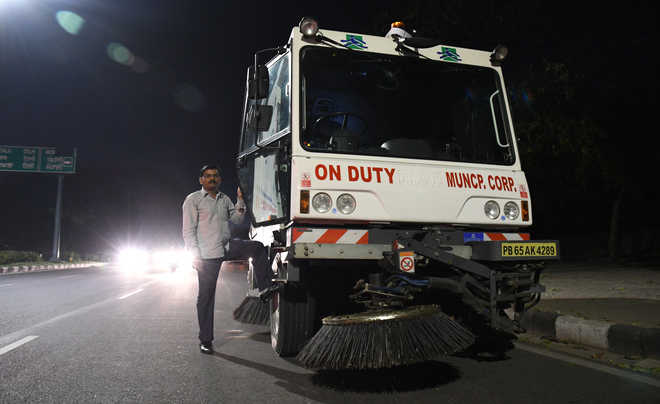Sweeping in India

Sweeping in India |
 |
A Night in the Life of a Street Sweeper Driver in Indiaby Sandeep Sinha
Sandeep Sinha is a journalist who has written a variety of articles on different types of machinery, including travelling atop a combine harvester, a road-roller and inside a train engine. In this case, he thought he'd give a turn at finding out more about what he called 'a road-cleaning contraption.'Moving around the city, there are sights and sounds that capture your imagination. You love the feel and the familiarity. The mechanised street sweepers of the Chandigarh Municipal Corporation were one sight that would always catch my attention. I had seen it cleaning the streets early in the morning near the furniture market in Sector 34 and at night near the Sector 32 roundabout. Finally, on Monday night, while heading home from work, as I decided to take a detour, I sighted a Dulevo street sweeper at work in the service lane opposite Hotel JW Marriott. I caught up with it, parked my car by the roadside, parking lights on, and accosted the driver. I had travelled atop a combine harvester, a road-roller and inside a train engine, and giving this road-cleaning contraption a try wasn't that bad an idea at all. Mio Caro (my dear)! I accost the driver who stops the brightly lit Dulevo. Even as politicians rail against the Italian origins of Sonia Gandhi, here is a machine from Italy, keeping our city clean. Vijendra Singh, the man at the wheel, peered out of the window with a smile, surprised at being stopped at 1.30 at night by a man who did not appear to have anything to do with his profession. Vijendra is 40 years old and hails from Aligarh in Uttar Pradesh. He has been with the Chandigarh Municipal Corporation for the past two years and gets a salary of Rs 21,000 ($322 US). Before this, he was with the civic body in Mohali for a year. Vijendra works for a company, Lion Services Ltd, which provides the city cleaning service to the Municipal Corporation. He has been with the company since 2004. The company claims to be India's first mechanised road sweeping venture, providing comprehensive cleaning solution to municipalities in Indian cities. Its geographic information system (GIS)-based mechanised sweeping project in Mohali was adjudged as "industry best practice" by the Union Ministry of Urban Development. Vijendra Singh is an expert in operating the street cleaners and has worked for his company earlier at the Delhi airport, in Noida, and in Jharkhand, where he operated the cleaners at the Tata's steel plant. In Chandigarh, he lives with his wife, two daughters, a son and his parents, at Darba village, situated near the railway station but keeps visiting Aligarh once a month to catch up with his extended family. Vijendra Singh's duty hours are from 8 pm to 6 am, with a tea-break in between, around 1 am or 2 am. He rests during the day. The mechanised street-sweepers, costing an estimated Rs 2.5 crore (@$300,000 US) apiece, according to its driver, are picked from the CTU workshop located in the Industrial Area and then parked there again after the work is over. The garbage collected by the machine is loaded onto a tractor-trailer accompanying his Dulevo and cast away at the dumping ground in Daddu Majra. On Monday night, his duty was to clean the road till the Zirakpur barrier. Vijendra Singh was part of a group of three street-cleaning machines, though they are not runtogether. His supervisor was also on the route. Upon my request, Vijendra Singh allows me to board his Dulevo street sweeper and demonstrates how it works, taken aback by the persistence of a pen-pusher who revels in nocturnal forays. There is a panel with four levers, between the two seats, that are used to operate the sweepers at the front, left, right and centre. On the window sill of his seat are switches that are used to adjust the water spray. The machine sucks waste, including dust, and has a capacity of two tonne, but the fallen tree leaves take up much space, he points out. There is a small screen where the rear-view mirror usually is. The screen brings images from the camera installed at the rear of the vehicle. We can see rows of cars parked behind. There is a small fire extinguisher below, in front of the seat on which I am seated, for any emergency. Vijendra is a cheerful man, answering my queries with a smile, and gives me a joyride. Across the road, inside the JW Marriott, we can see the hotel's doorway lit up brightly, as guests prepare to leave. A bike with three youths, sans helmet, revved up to my side of the Dulevo's door. "Bhai sahib, roti-pani toh kha liya na," the one driving it asks in jest. I nod in affirmation, they laugh, amused at the spectacle. Acquaintances made, I exchange phone numbers, shake hands and depart, confident in the knowledge that Chandigarh is putting its best foot forward to remain a clean city, a green city. We hope this information gives those in the sweeping industry in other countries around the world a better idea of the sweeping industry in India.
This article by Sandeep Sinha first appeared in The Tribune, based in Chandigarh, the largest selling daily in North India, whose mission includes publishing news and views without any bias or prejudice of any kind. The Tribune website is www.tribuneindia.com.
|